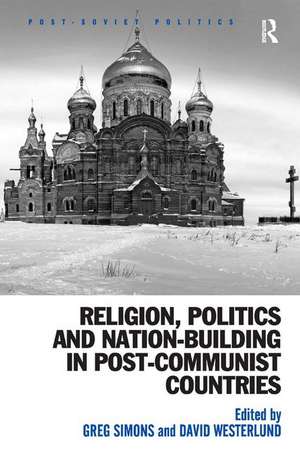Religion, Politics and Nation-Building in Post-Communist Countries: Post-Soviet Politics
Autor Greg Simons, David Westerlunden Limba Engleză Hardback – 28 feb 2015
Din seria Post-Soviet Politics
-
 Preț: 341.55 lei
Preț: 341.55 lei - 22%
 Preț: 324.16 lei
Preț: 324.16 lei - 28%
 Preț: 739.39 lei
Preț: 739.39 lei -
 Preț: 465.91 lei
Preț: 465.91 lei - 18%
 Preț: 1005.46 lei
Preț: 1005.46 lei - 15%
 Preț: 669.94 lei
Preț: 669.94 lei -
 Preț: 376.37 lei
Preț: 376.37 lei -
 Preț: 489.26 lei
Preț: 489.26 lei - 18%
 Preț: 1114.70 lei
Preț: 1114.70 lei - 19%
 Preț: 247.40 lei
Preț: 247.40 lei - 15%
 Preț: 705.53 lei
Preț: 705.53 lei - 19%
 Preț: 259.07 lei
Preț: 259.07 lei - 16%
 Preț: 242.71 lei
Preț: 242.71 lei - 25%
 Preț: 769.00 lei
Preț: 769.00 lei - 18%
 Preț: 1002.63 lei
Preț: 1002.63 lei - 15%
 Preț: 259.51 lei
Preț: 259.51 lei -
 Preț: 382.75 lei
Preț: 382.75 lei -
 Preț: 381.81 lei
Preț: 381.81 lei -
 Preț: 386.39 lei
Preț: 386.39 lei -
 Preț: 319.91 lei
Preț: 319.91 lei -
 Preț: 386.00 lei
Preț: 386.00 lei -
 Preț: 387.91 lei
Preț: 387.91 lei -
 Preț: 388.26 lei
Preț: 388.26 lei -
 Preț: 385.71 lei
Preț: 385.71 lei - 17%
 Preț: 272.50 lei
Preț: 272.50 lei - 18%
 Preț: 1005.17 lei
Preț: 1005.17 lei - 18%
 Preț: 1007.48 lei
Preț: 1007.48 lei - 18%
 Preț: 1053.33 lei
Preț: 1053.33 lei - 25%
 Preț: 496.94 lei
Preț: 496.94 lei
Preț: 766.57 lei
Preț vechi: 1104.16 lei
-31% Nou
Puncte Express: 1150
Preț estimativ în valută:
146.68€ • 153.56$ • 121.37£
146.68€ • 153.56$ • 121.37£
Carte tipărită la comandă
Livrare economică 07-21 aprilie
Preluare comenzi: 021 569.72.76
Specificații
ISBN-13: 9781472449696
ISBN-10: 147244969X
Pagini: 234
Dimensiuni: 156 x 234 x 22 mm
Greutate: 0.59 kg
Ediția:1
Editura: Taylor & Francis
Colecția Routledge
Seria Post-Soviet Politics
Locul publicării:Oxford, United Kingdom
ISBN-10: 147244969X
Pagini: 234
Dimensiuni: 156 x 234 x 22 mm
Greutate: 0.59 kg
Ediția:1
Editura: Taylor & Francis
Colecția Routledge
Seria Post-Soviet Politics
Locul publicării:Oxford, United Kingdom
Recenzii
’A collection of in-depth research articles dedicated to religions from Orthodox Christianity to shamanism and problems ranging from political dimension of winter-bathing to survival strategies of religious minorities. The volume gives an insight into the religio-political space embracing Russia and several East European countries from the viewpoint of building national and ethnic identities.’ Anastasia V. Mitrofanova, Russian Orthodox University of St John the Divine, Russia ’Avoiding simplistic generalizations, Religion, Politics and Nation-Building exhibits the remarkable variety of the religious and political trends at work in Post-Communist countries today. The authors respect the character of each case which they discuss while establishing many instructive points of comparison. They present their highly charged subject matter in an admirably balanced way.’ Paul Valliere, Butler University, USA
Notă biografică
Dr Greg Simons holds a doctoral degree from the University of Canterbury in New Zealand. He is currently employed at Crismart (Crisis Management Research and Training) in the Swedish National Defence College and at the Uppsala Centre for Russian and Eurasian Studies (Uppsala University). Professor David Westerlund has a Ph.D. degree in the History of Religions from Stockholm University. He is Professor in the Study of Religions at Södertörn University in Stockholm. His research interests include modern Islam and Christianty, particularly Pentecostalism, in Africa and Europe. Thematically, he is specialised on issues of religion and health, inter-religious relations, religion and politics, historiography and religious revival movements.
Cuprins
Introduction, GregSimons, DavidWesterlund; Chapter 1 Religious Diplomacy in International and Inter-Orthodox Relations, GregSimons; Chapter 2 Religious, Cultural and Political Dimensions of Winter-Bathing in Russia, Per-ArneBodin; Chapter 3 ‘Orthodoxy or Death!’, MariaEngström; Chapter 4 Shamanism, Politics and Ethnos-Building in Russia, OlleSundström; Chapter 5 The Approved and the Disapproved Islam in Russia, KaarinaAitamurto; Chapter 6 Islamic Opposition in Azerbaijan, SofieBedford; Chapter 7 Religion and Nation-Building in Estonia, RingoRingvee; Chapter 8 Church and State Relations in Poland, with Special Focus on the Radio Station Mary, KonradP?dziwiatr; Chapter 9 Majority, Minorities and Religious Pluralism in Romania, CatalinIonete; Chapter 101 Comparative Conclusions and Wider Implications, GregSimons, DavidWesterlund;
Descriere
The increasing significance and visibility of relationships between religion and public arenas and institutions following the fall of communism in Europe provide the core focus of this fascinating book. Leading international scholars consider the religious and political role of Christian Orthodoxy in the Russian Federation, Romania, Georgia and Ukraine alongside the revival of old, indigenous religions, often referred to as 'shamanistic' and look at how, despite Islam’s long history and many adherents in the south, Islamophobic attitudes have increasingly been added to traditional anti-Semitic, anti-Western or anti-liberal elements of Russian nationalism.
